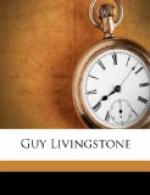I looked at my companion very nervously. He never spoke, but I saw him gnaw his under lip till the blood ran down.
We had gone a hundred paces or so farther along a narrow path outside the town. On our right the cliff fell almost abruptly toward the river. Guy was a few paces in front, when suddenly there broke from his lips such a sound as I have never heard from those of any mortal before or since.
It is impossible to describe it. It was utterly involuntary, as if some spirit had spoken within the man—a cry of horror and of unspeakable wrath, such as might have burst from the chest of one of the Old-World giants, when the rock fell from heaven that crushed him like a worm. The Italians, used to every tone that can express passion, shrunk and cowered back in terror.
Our eyes all followed the direction of his, that were staring down upon a flat open space, clear from brush-wood, down in the hollow on our right. Our search was ended, and we knew it. The moon, that flickered and quivered elsewhere through bough and brake, settled there steadily on a single white spot.
In all the world there is but one object on which she can cast so ghastly a reflection—a dead man’s face.
Guy recovered himself first, and plunged recklessly down the cliff side. When we reached him, he was supporting on his knee the head of poor Charley Forrester, stone dead, and foully murdered.
The first glance told how unavailing all human aid must be. One small deep wound just above the left temple must have been fatal instantly. Close by his side lay the instrument of the slaughter—a thin, triangular piece of granite—and, ten paces off, his pistol, one barrel discharged. His watch and (as we afterward found) his purse were gone, but an emerald ring of great value was still untouched on his finger.
I staggered back, heart-sick and faint. When I recovered I saw dimly the group of men, awe-stricken and whispering, and Guy still gazing down at the face that rested on his knee, as if it fascinated his eyes. I could not bear to look upon the piteous sight. All through the bright hair the dark blood had soaked, and a slow stream was stealing through it still; the fair features were all defaced and deformed with the wrath and agony of the last mortal struggle. Yet I do remember that, if any one definite expression still lingered there, it was bitter contempt and scorn.
“In God’s name, sir, what is to be done?” It was Hardy who spoke, poor Forrester’s own servant, the only Englishman among our attendants. He was choking, and could hardly gasp out the words.
Livingstone rose slowly, first pillowing the mangled head on a soft tuft of moss, tenderly as if it were conscious still. His nature was such that no shock, or pain, or sorrow to which humanity is liable, could bend or quell it, so as to deprive him, beyond a brief instant, of self-possession and calmness. It was not insensibility now, and hardly stoicism, but an elasticity of resistance and strength of endurance that, in my own knowledge, have never been matched. In history or in Indian life you might find many parallels.




